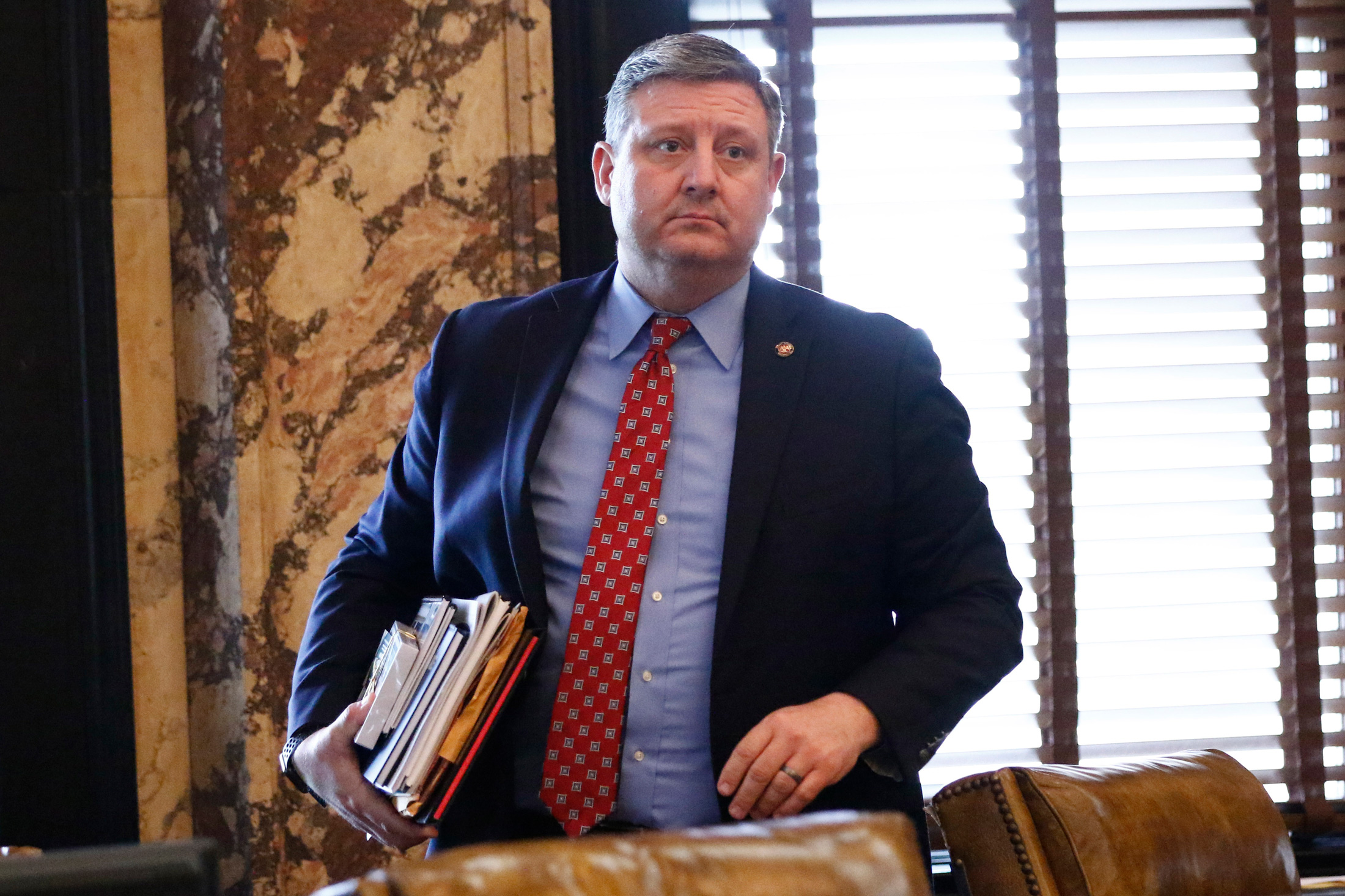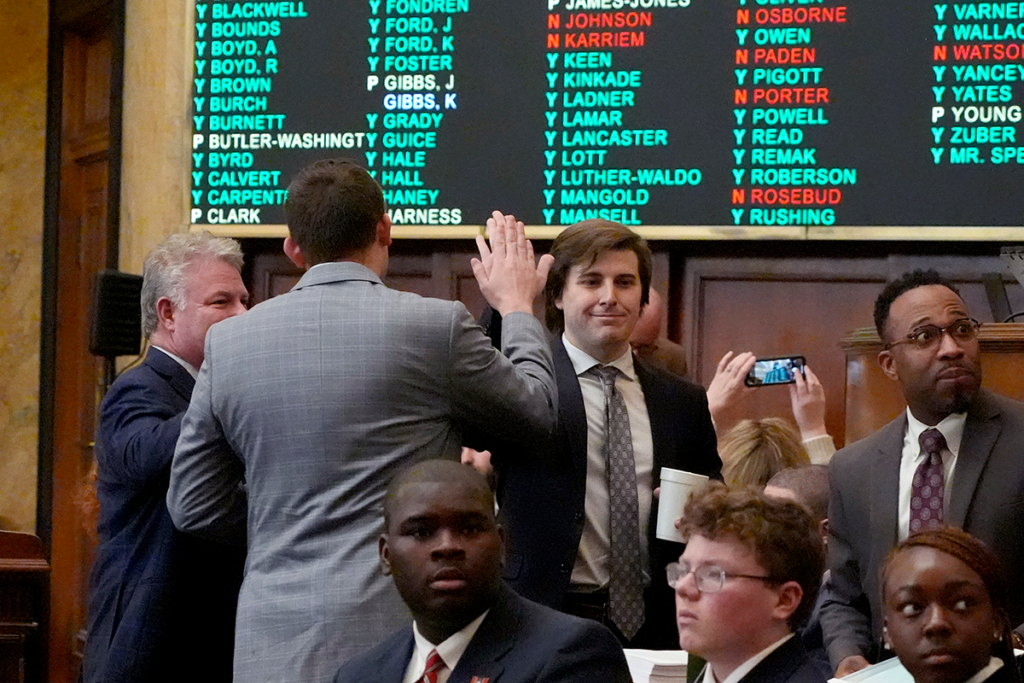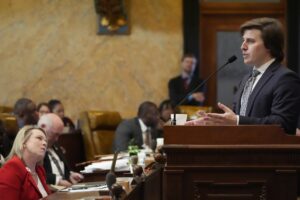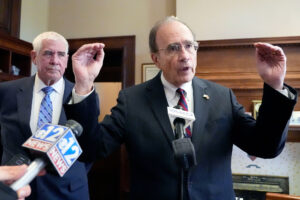Most Mississippi schools could soon receive greater levels of funding under a new formula the state House passed Wednesday. The bill, known as the INSPIRE Act, would “put more equity in poor districts,” the bill’s principal author, Rep. Rob Roberson, the bill’s principal author, told colleagues on the House floor on Wednesday.
The INSPIRE Act earned approval from a bipartisan 95-13 majority with 14 members voting present. The 400-plus page bill proscribes a formula for education funding based on individual student costs and would replace the current formula legislators adopted in 1997, the Mississippi Adequate Education program.
“We’ve got a program and a formula in front of you today that puts as much emphasis on equity for our school districts as anything you’ve ever seen,” Roberson, a Starkville Republican, said Tuesday. “This formula basically takes and gives an opportunity to districts that aren’t doing as well—poor districts, districts that have struggled to maintain a C. … A lot of your people out here will tell you that money doesn’t change education in the sense that you should be able to have a good school district, well, I’m here to tell you: The lack of it certainly will.”
The proposed formula is based on the cost of educating an individual student and includes additional funding “weights” for special student populations, such as low-income, English language learners, special education students and students in career-technical education programs.
“We’re giving a weight to that district that’s in poverty, for kids that are in special needs (programs) … so that children that need additional help will have the funding to back that help up. That’s not something we’ve done before. The bottom line is, this does that,” Roberson said.
While explaining the bill on the House floor on Wednesday, Rep. Kent McCarty, R-Hattiesburg, noted that while the vast majority of school districts would enjoy funding increases under the INSPIRE Act, some well-funded districts in wealthier areas such as the Jackson suburbs in Madison and Rankin counties would experience slight decreases.
McCarty noted that he was only three years old in 1997 when the Legislature passed the current funding formula, also known as MAEP. Since then, lawmakers have only fully funded education under the MAEP formula twice, mostly recently in 2008.
The House’s education funding formula bill, he said, would bring schools more funding than a competing proposal in the Mississippi Senate and “more money than we’ve ever even thought about proposing on this side of the building.”
The INSPIRE Act says that the “student base amount may be no less than” $6,650 per student, with the base amount set annually in an appropriation bill. The minimum amount “may be revised in subsequent years in accordance with provisions for periodic review and revision of the funding formula, the legislation says.
Lawmakers estimate the INSPIRE Act would increase school funding by $241 million over the next fiscal year to $2.96 billion; if the Legislature fully funded MAEP over the next year, it would cost $2.99 billion, Mississippi Public Broadcasting reported.
The bill now goes to the Senate, which is considering its own school funding bill.
Public Ed Advocates Spilt on INSPIRE Act
Not everyone is comfortable with the proposed education funding formula. Nancy Loome, a public education lobbyist and the executive director of the Parents’ Campaign, said she’s concerned that, unlike MAEP, the INSPIRE Act does not go far enough to objectively define base costs.
“The thing that we know for sure is that it does not contain any objective formula for determining the base costs,” she told the Mississippi Free Press on Feb. 26. “That is up to the legislature every year to just pick a number.”

The Mississippi Adequate Education Program formula calculates the amount needed to provide adequate operating funding for a district to meet a “successful” rating by the Mississippi Department of Education and is recalculated every four years to account for inflation. Disagreements on the formula have long plagued legislative sessions since MAEP’s passage in 1997, though.
On Feb 20, The Parent’s Campaign, the Mississippi Association of Educators, the Mississippi Association of School Administrators, the Mississippi Association of School Superintendents and the Mississippi Association for Professional Educators sent a letter to state lawmakers urging them to consider factors they deemed as “essential components of Mississippi’s public school funding statue.” They noted four necessary items, including an objective formula for base cost, an inflation factor, additional needs-based funding and an equity provision.
“As organizations committed to the well-being of Mississippi’s public school children and teachers, we believe that a guiding principle in the development of (the public school funding formula) should be an understanding that the purpose of a school funding formula is to reflect the true cost of educating Mississippi children to a proficient level in core academic subjects and otherwise preparing them for college and career,” the letter stated.
The Parent’s Campaign has already sent an action alert asking people to call their state lawmakers to demand an objective formula.
The Senate’s competing education funding bill, Senate Bill 2332, would keep MAEP but revise it, increasing education funding by $210 million.
Mississippi First Executive Director Rachel Canter told the Mississippi Free Press on March 3, 2024, that she thinks the House Bill is a better option because the weights would increase equity. She said a formula based on operational costs and add-ons is outdated. One of the suggestions Mississippi First made to lawmakers, she said, was to use average daily membership or enrollment instead the currently used average-daily-attendance metric as part of its calculations.
“Average daily attendance essentially measures the number of kids who show up to school, not the number of kids who are enrolled in your school,” Canter said. “If you are a low-income district, or a district within a community that has a lot of need, you are far more likely to struggle with chronic absenteeism … . Because you’re more likely to struggle with chronic absenteeism, your ADA is going to be lower which means that you are going to get less money for all of your children that you’re supposed to be serving than a high-income district that doesn’t have as deep student need.”
Canter also said that she disagrees with education advocates who say the State needs an objective formula built into the legislation. She said most states don’t have a base cost calculation like Mississippi. She supports a periodic adequacy study to examine expenditures, inflation and student outcomes as a measure of the formula’s effectiveness. She said that even if lawmakers did define a calculation, “they could do that and then ignore it because that’s what they do right now (with MAEP).”
“We have a very specific methodology and they just ignore it. However, people seem to feel more comfortable if it was there, even if they ignore it,” Canter said.
Senate Bill Would Keep MAEP
The Senate Education Committee approved its bill to revise MAEP on Feb. 22. It proposes increasing local contribution rates, removing a provision that prevents districts from receiving less funding than they did in 2002 (which has kept funding higher than it would be in some districts despite significant population declines) and introducing a temporary measure preventing districts from receiving less funding in fiscal year 2025 than fiscal year 2024.
The Senate passed a similar bill last legislative session after its leaders heard from a group of education associations wanting to rework the formula. That legislation died amid disagreements between the two chambers last year. This year’s version includes language that says that 90% of the funds must be used on expenses other than administrative salaries. The bill also includes language stipulating that when charter school students move back to traditional schools, their prorated share of school funding goes back to the school district.
“We feel good about the Senate bill,” Nancy Loome said.

As the Legislature grapples with funding the current schools in the state, Gov. Tate Reeves is wants to open more. During his State of the State address on Feb. 26, the governor proposed adding magnet schools to the state’s education system. Reeves suggested opening 12 mathematics and engineering schools across the state modeled after the existing Mississippi School for Mathematics and Science, including opening one in the former Central High School building which currently houses the Mississippi Department of Education.
“By establishing eight pre-K-through-8 schools and three more high schools, we can help to ensure Mississippi kids are given the education required to be successful in an increasingly technological economy,” Reeves said in his address.
Loome said those proposals are just fodder until lawmakers at least try fully funding MAEP for several consecutive years.
“(These ideas) provide cover for not doing the thing that is the real answer, which is fully funding our schools and making sure they have the resources they need to have good facilities, to have to address the teacher shortage and to make sure we’ve got a high-quality teacher in every classroom,” the Parents’ Campaign director said. “Let’s get serious about this. Once you’ve tried all those things for a few years, then I’ll listen to on these other little tinkering around the edges things.”










